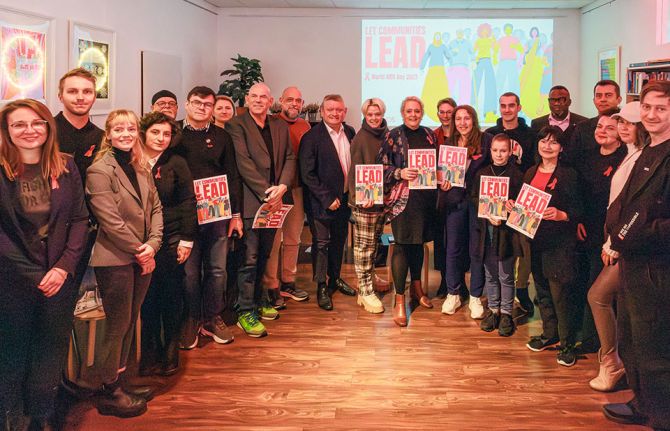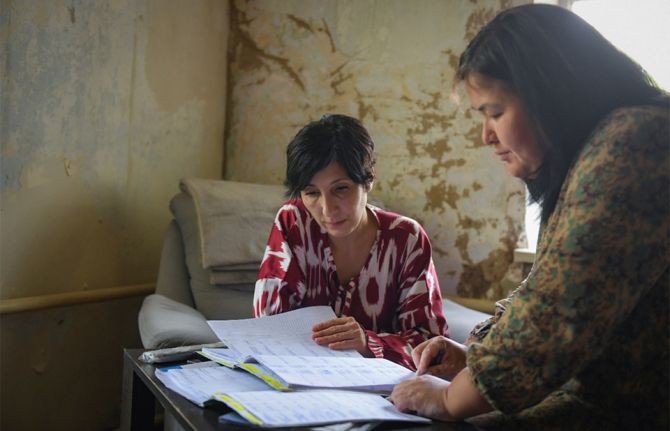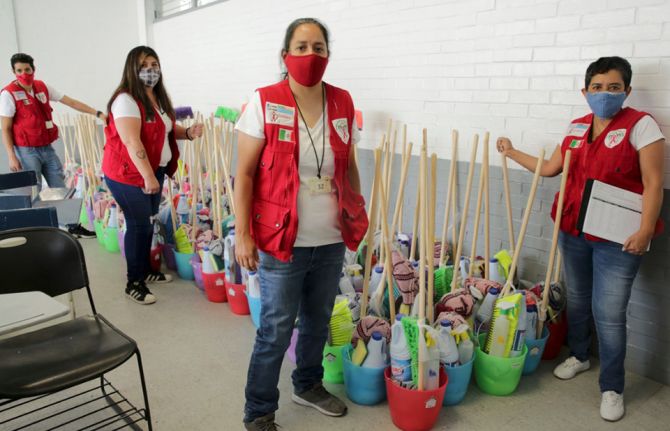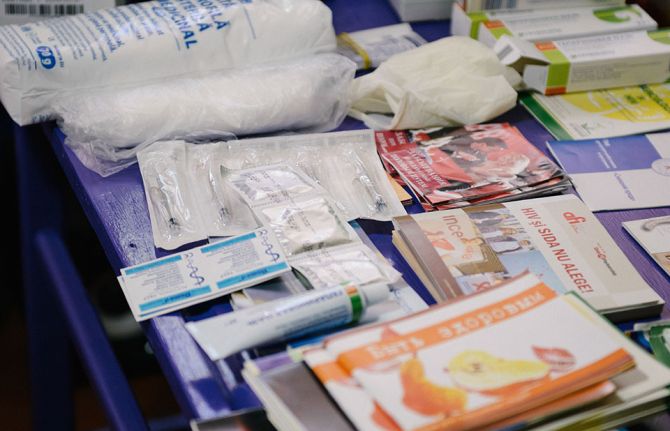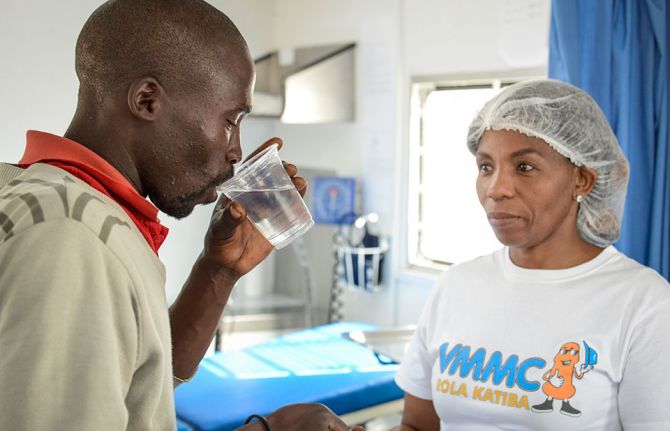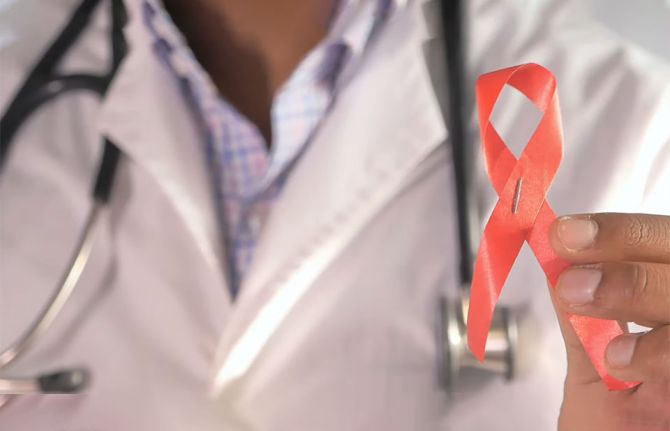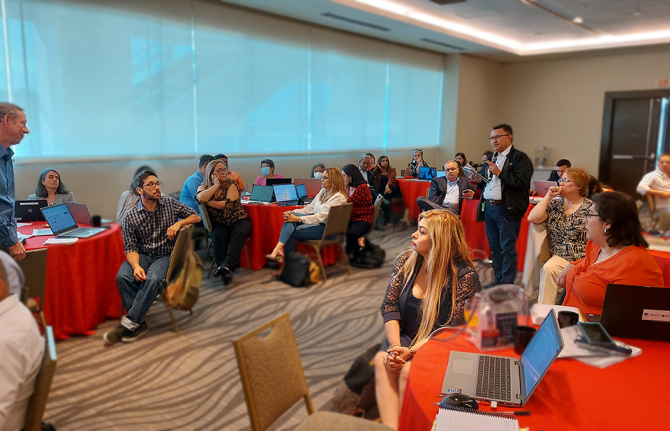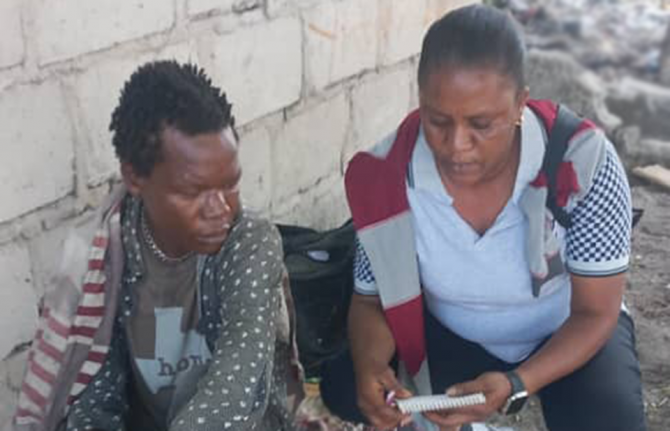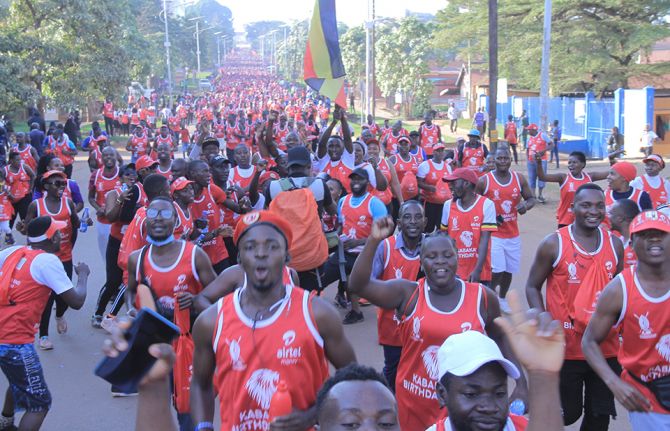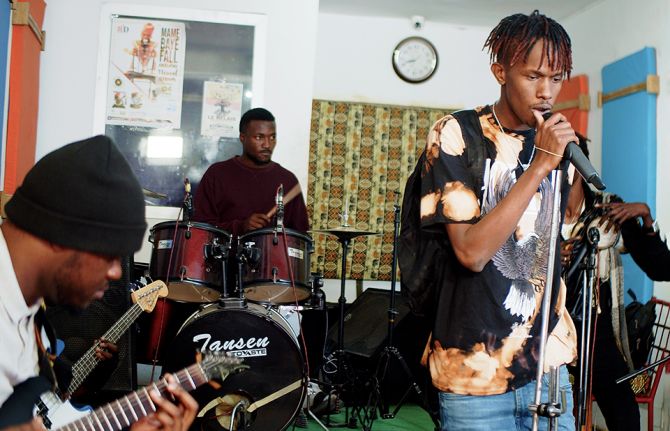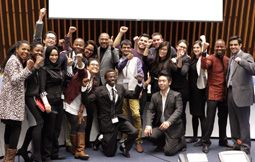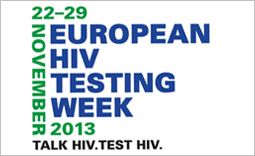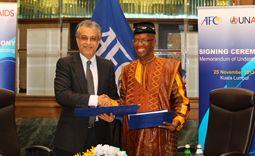
Feature Story
Sexuality education an imperative for children and young people in a world affected by AIDS
10 December 2009
10 December 2009 10 December 2009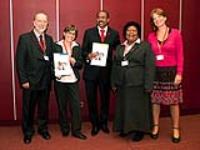
(From L to R) Mark Richmond, UNESCO’s Global Coordinator on HIV and AIDS, Dr Mariangela Batista Galvao Simao, Director, Brazil National STD/AIDS Programme, Michel Sidibé, UNAIDS Executive Director, Elizabeth Mataka, member of the Global Advisory Group on Sexuality Education and the UN Secretary-General’s Special Envoy for AIDS in Africa and Marijke Wijnroks, the AIDS ambassador for the Netherlands
Credit: UNAIDS/D.Bregnard
In many parts of the world, a combination of social taboos, unavailability of sound information, lack of resources and infrastructure make it difficult for children and young people to access sexuality education aimed at improving knowledge and reducing risk. This leaves many young people vulnerable to coercion, abuse, exploitation, unintended pregnancy and sexually transmitted infections, including HIV.
According to the UNAIDS 2008 Global Report on the AIDS Epidemic, only 40% of young people aged 15-24 had accurate knowledge about HIV and transmission. It should come as no surprise that, against this background of insufficient levels of basic knowledge, young people aged 15-24 account for 40% of all new HIV infections (UNAIDS 2009 AIDS Epidemic Update).
In response to this challenge, the voluntary and non-mandatory International Technical Guidance on Sexuality Education developed by UNESCO in partnership with UNAIDS, UNFPA, UNICEF and WHO seeks to assist education, health and other relevant authorities to develop and implement school-based sexuality education materials and programmes. The International Technical Guidance on Sexuality Education is based on a rigorous review of evidence on sexuality education programmes and is aimed at education and health sector decision-makers and professionals.
If we are to make an impact on children and young people before they become sexually active, comprehensive sexuality education must become part of the formal school curriculum, delivered by well trained and supported teachers.
Michel Sidibé, UNIADS Executive Director
Sexuality education can play a key role in improving knowledge and reducing sexual risk behaviours among young people. Equipped with better knowledge, information and skills, young people can be empowered to make informed decisions about sexual choices.
“If we are to make an impact on children and young people before they become sexually active, comprehensive sexuality education must become part of the formal school curriculum, delivered by well trained and supported teachers,” says Michel Sidibé, UNAIDS Executive Director. “Teachers remain trusted sources of knowledge and skills in all education systems and they are a highly valued resource in the education sector response to AIDS.”
The International Technical Guidance on Sexuality Education was co-authored by leading experts in the field of sexuality education and subjected to extensive review and comment by a global panel of experts and practitioners from civil society organizations, ministries of education and international agencies. Volume I of the International Technical Guidance on Sexuality Education focuses on the rationale for sexuality education and provides sound technical advice on characteristics of effective programmes. It is the outcome of a rigorous review of the literature on the impact of sexuality education and sexual behaviour, drawing upon 87 studies from around the world.
Numerous studies show that with the right information and skills, young people can change their behaviour to reduce the risk of acquiring HIV infection or passing it on to others.
Mark Richmond, UNESCO’s Global Coordinator on HIV and AIDS
A companion document (Volume II) focuses on the topics and learning objectives to be covered in a ‘basic minimum package’ on sexuality education for children and young people from 5 to 18+ years of age and includes a bibliography of useful resources. It was informed by a review of curricula from 12 countries, as well as other international models.
“Numerous studies show that with the right information and skills, young people can change their behaviour to reduce the risk of acquiring HIV infection or passing it on to others,” says Mark Richmond, UNESCO’s Global Coordinator on HIV and AIDS and the Director for the Division for the Coordination of UN Priorities in Education. “At a minimum, HIV and AIDS education needs to include information on the HIV virus and its modes of transmission. At some point, HIV and AIDS education must introduce sex and relationships education - simply because over 75% of all HIV infections occur through sexual transmission.”
The UN organizations called on policy-makers to listen to young people, families, teachers and other practitioners, and use the International Technical Guidance to make sexuality education an integral part of the national response to the HIV pandemic.
UNESCO and its partners including UNAIDS, UNFPA, UNICEF and WHO, as well as a wide range of other partners, will support governments in operationalising the International Technical Guidance on Sexuality Education at regional and country level. The two volumes of the International Technical Guidance will be published in all the six UN languages (Arabic, Chinese, English, French, Russian and Spanish) as well as Portuguese.
Sexuality education an imperative for children an
Key populations:
Cosponsors:
Feature stories:
Michel Sidibé calls for prevention revolution in opening address at UNAIDS’ governing body meeting (08 December 2009)
Preventing HIV through education in Latin America and Caribbean (31 July 2009)
New publication champions a strategic approach to HIV and education (15 June 2009)
Publications:
International Technical Guidance on Sexuality Education (Volume-I) (pdf, 2.84 Mb.)
International Technical Guidance on Sexuality Education (Volume-II) (pdf, 1.94 Mb.)
Related

Feature Story
Secretary-General's Message for Human Rights Day 2009
10 December 2009
10 December 2009 10 December 2009No country is free of discrimination. We see it everywhere, in many forms: old and new, covert and blatant, public and private. It may appear as institutionalized racism, as ethnic strife, as episodes of intolerance and rejection, or as an official national version of history that denies the identity of others.
Discrimination targets individuals and groups that are vulnerable to attack: the disabled, women and girls, the poor, migrants, minorities, and all those who are perceived as different.
These vulnerable people are frequently excluded from participating in the economic, political, cultural and social lives of their communities. The bigotry that stigmatizes and excludes them can be exploited by extremists. In some countries, we are witnessing the rise of a new politics of xenophobia.
But these victims of discrimination are not alone. The United Nations is standing with them, committed to defending the rights of all, and particularly the most vulnerable. That is our identity and our mission. The international human rights community continues to counter bias and hatred. Public awareness has led to global treaties offering legal protection from discrimination and unequal treatment.
But abstract commitments are not enough. We must continue to confront inequality and intolerance wherever they are found.
On Human Rights Day, I invite people everywhere, at all levels, to join the United Nations and human rights defenders around the world in the fight against discrimination.
Ban Ki-moon
Secretary-General's Message for Human Rights Day
Cosponsors:
UNDP
UN Office of the High Commissioner for Human Rights
Statements:
Secretary-General's Message for Human Rights Day 2009
Publications:
HIV-related Stigma, Discrimination and Human Rights Violations Case studies of successful programmes (pdf, 1 Mb.)
International Guidelines on HIV/AIDS and Human Rights (pdf, 932 Kb.)
The UNAIDS Guide to the United Nations Human Rights Machinery (pdf, 3.53 Mb.)
Related

Feature Story
16 Days of Activism: The forgotten victims of conflict in the Congo
09 December 2009
09 December 2009 09 December 2009A version of this story was first published at www.unhcr.org

A group of displaced women making handicrafts in eastern Congo.
Credit: UNHCR/D.Nthengwe
Tomorrow, December 10 marks the end of 16 days of activism to end violence against women, an international campaign. UNHCR, the UN refugee agency, is taking the opportunity to draw attention to its work, alongside local partners, in challenging the very high number of rapes occurring in the eastern Democratic Republic of the Congo.
Twenty-eight-year-old widow Kahindo is lucky to be alive after being attacked and abused by armed men while fleeing her village in the Democratic Republic of the Congo (DRC), a country with one of the highest rates of rape in the world.
The young woman and her six children ran into a group of men not far from the village in eastern DRC's volatile North Kivu province. "My reaction was a sigh of relief, thinking we were not going to run anymore," Kahindo recalled. "I was wrong."
She was led away from her children and then "six armed men stripped me naked. They began to rape me one after the other until I went into a coma," an emotional Kahindo told UNHCR near the North Kivu capital, Goma. "They left me for dead."
Today, almost four years later, this forcibly displaced woman sometimes feels that she might as well have died. In between sobs, she told of the terrible price she has paid. "Medical tests showed that I also contracted HIV," she said, adding: "The impact of rape is not just. The stigma that I face is not just, either."
The best strategy to winning this war is to prevent rape from taking place.
Karl Steinacker, coordinator of UNHCR operations in eastern DRC
The widow believes, "I was raped as a punishment for what I am. Those men wanted to degrade me and insult my family, dignity, my culture and everything I stand for."
Her story is appalling, but by no means isolated. According to UN figures, almost 3,500 females were raped by soldiers, militiamen and civilians during the first six months of this year in eastern DRC, compared to some 4,800 for the whole of 2008. The real figures are believed to be higher because many victims do not come forward. During a visit to North Kivu last August, US Secretary of State Hillary Clinton called the widespread sexual violence against women in the conflict-swept region "a crime against humanity."
The forcibly displaced are particularly vulnerable in an area where hundreds of thousands are living with host families or in camps run by UNHCR despite the formal end of war in the DRC in 2003. Civilians live under the constant threat of armed men who pillage, rape, burn houses and confiscate food rations.
These women are very much in the mind of UNHCR and its local implementing partners, such as Women for Women International (WWI) and Search for Common Ground, during the 16 days of activism to end violence against women.
WWI has a project in the DRC to help those who have been raped. "We are making a difference in the lives of rape survivors," said Jose Rugamba, a WWI counsellor based in Goma. "But we cannot say the phenomenon has diminished," she added.
Lena Slachmuijlder, director of Search for Common Ground, said years of war had radicalized attitudes towards women and this was obstructing attempts to combat sexual violence in the DRC. "That is why the scourge of gender-based sexual violence will not reduce, or end, anytime soon."
Most women argue that the failure to jail and punish convicted offenders has led to a culture of impunity and to growing misogyny. "Twenty years is usually the jail term for offenders. But here in Congo, a rapist can be released after paying the equivalent of US$3 to a prison warden," claimed one woman.
Sexual violence can also have a devastating effect on family relationships. Rape survivors are often rejected by family members and their communities, who fail to appreciate the physical and psychological trauma of rape. Changing mindsets will take a long time.
"The best strategy to winning this war is to prevent rape from taking place," said Karl Steinacker, coordinator of UNHCR operations in eastern DRC. That will be a tough task, and one that must tackle immunity and help spread awareness.
Under a UNHCR-sponsored programme, Search for Common Ground is trying to do the latter. The United States-based non-governmental organization has been going through towns and villages in eastern and south-eastern provinces screening films and videos on the issue of sexual and gender-based violence.
Slachmuijlder said the mobile cinema has an impact because the subjects of the films are real people. By allowing the victims of sexual violence to speak out, she said, "We are giving space for interaction and debate on issues people consider taboo, but which should be openly discussed to demystify the issues."
In partnership with other agencies, UNHCR is also assisting rape victims through counselling, medical treatment, micro-finance projects and reintegration activities.
For UNAIDS, this issue is a major concern and its Outcome Framework 2009-11 has stopping violence against women and girls as one of nine priority areas.
16 Days of Activism: The forgotten victims of con
Cosponsors:
Press centre:
Feature stories:
UNHCR chief pledges to keep AIDS response a priority (03 December 2009)
Violence against women and HIV (10 November 2009)
UNAIDS partners in new Clinton Global Initiative to address sexual violence against girls (25 September 2009)
HIV in humanitarian crises: Opportunities and challenges (12 August 2009)
Addressing the HIV-related needs of “people on the move” (19 June 2009)
Challenging violence against women a key task for newly launched Caribbean Coalition on Women, Girls and AIDS (06 March 2009)
Publications:
Partnering with Men to End Gender-based Violence: Practices that work from Eastern Europe and Central Asia (pdf, 1.75 Mb.)
Women and Health: Today’s Evidence, Tomorrow’s Agenda
UNAIDS Outcome framework 2009-11 (pdf, 396 Kb.)

Feature Story
Footballers unite against AIDS
09 December 2009
09 December 2009 09 December 2009
Emmanuel Adebayor, Football player and UNAIDS Goodwill Ambassador, Michel Sidibé, UNAIDS Executive Director and Michael Ballack, Football Player and UNAIDS Goodwill Ambassador in Manchester on 6 December 2009.
Credit: Edward Garvey
On Saturday, 5 December 2009, Manchester City Stadium in the UK turned off its lights before the players entered the stadium as the UNAIDS campaign “UNITING THE WORLD AGAINST AIDS” featuring Michael Ballack and Emmanuel Adebayor played on the stadium’s two large scoreboards.
The match between Chelsea FC and Manchester City took place during the week of World AIDS Day, a time of solidarity for people living with HIV. The Executive Director of UNAIDS Michel Sidibé was invited as a guest of honor, to attend the game and meet the UNAIDS Goodwill Ambassadors at this unique event.
We must use this popular game as a force for change to reverse the spread of epidemic and raise people’s awareness around the disease and how to protect themselves.
Michel Sidibé, UNAIDS Executive Director
A Goodwill Ambassador since 2006, Michael Ballack who plays for Chelsea has dedicated much of his time and effort to support UNAIDS and the AIDS response. He has helped leverage FIFA to include HIV prevention in the World Cup preparations; spoken to leading politicians to pledge for a scaled up commitment to the AIDS response; and, disseminated HIV prevention messages through the media. Michael Ballack has dedicated space for UNAIDS and for HIV prevention messages on his own web site www.michael-ballack.com, and has featured in numerous media outlets including BBC, CNN, Newsweek and Der Spiegel.
Manchester City star, Emmanuel Adebayor was appointed a UNAIDS Goodwill Ambassador in March 2009, but began supporting UNAIDS prior to this date. Since joining UNAIDS, Emmanuel has engaged with the press to highlight the need for universal access to HIV prevention, treatment, care and support. He has spoken out about the importance of eliminating stigma and discrimination and undertaken an AIDS awareness mission in his native Togo.
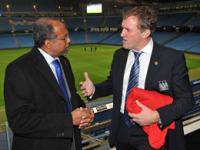
Michel Sidibé, UNAIDS Executive Director met with Gary Cook, CEO of Manchester City FC holding the UNAIDS advocacy swaetshirt in Manchester on 6 December 2009.
Credit: Edward Garvey
In 2008, Emanuelle Adebayor teamed up with Michael Ballack to star in the successful AIDS awareness campaign “United Against AIDS”, where the players feature in a public service announcement and print campaign. The story line builds around their rivalry on the pitch – but off the pitch – they are ‘united against AIDS’. The campaign also includes posters and postcards featuring HIV prevention messages.
As a former member of the Malian national football team, the Executive Director of UNAIDS Michel Sidibé is especially aware of the unique impact sport can play in the response. “We must use this popular game as a force for change to reverse the spread of epidemic and raise people’s awareness around the disease and how to protect themselves,” said Michel Sidibé.
UNAIDS’ Executive Director also met with the CEO of Manchester City Football Club, Mr Gary Cook, to thank him for his generous support to UNAIDS. Mr Cook congratulated UNAIDS on the current campaign and pledged his continued support to the initiative.
“Together we can unite the world against AIDS”.Footballers unite against AIDS
Multimedia:
Emmanuel Adebayor
& Michael Ballack PSA
Photo gallery
Contact:
Tina Bille
Tel. +41 79 611 0031
E-mail: billet@unaids.org
Related

Feature Story
UN Office on Drugs and Crime tackles HIV in prisons
08 December 2009
08 December 2009 08 December 2009
In most countries around the world HIV prevalence is higher among prisoners than in the general population. This is due to a number of factors including the relative lack of knowledge about HIV among prisoners, lack of access to protective measures, often violent conditions, overcrowding and inadequate health services.
To help tackle this situation in Africa, the United Nations Office on Drugs and Crime (UNODC), in partnership with WHO, the World Bank and UNAIDS has launched the African HIV in Prisons Partnership Network (AHPPN).
The initiative was announced at the east and southern Africa consultation which took place on 17 and 18 November 2009. The consultation brought together representatives from prison authorities, civil society, national AIDS councils, health, research and academic institutions, as well as United Nations agencies from 16 African countries.
Responding to the situation in prisons is not only of the essential for those incarcerated but for society as a whole. When released back into the community prisoners who have been vulnerable to HIV infection while in prison may then go on to engage in high risk behaviours outside of prison.
Despite such challenges, strategies to address HIV in prisons are often isolated and not well integrated into national AIDS plans and programmes.
The African HIV in Prisons Partnership Network will support efforts to mount effective, human rights-based responses to HIV in Africa’s prisons. It also hopes to facilitate knowledge sharing and the forging of alliances between a range of partners to encourage a coherent, broad and holistic approach.
We need more comprehensive information about the HIV situation in prisons across Africa...This information should inform the development of evidence-based comprehensive, HIV prevention, care, treatment and support services for men, women and juveniles in prisons and ex-prisoners; without discrimination
Ms. Elizabeth Mataka, the United Nations Secretary-General’s Special Envoy for AIDS in Africa
Championing this need for coordination, Ms. Elizabeth Mataka, the United Nations Secretary-General’s Special Envoy for AIDS in Africa and keynote speaker at the launch noted, “We cannot work in silos…we need everyone, from government officials, National AIDS Councils, law enforcement agencies, civil society organisations, prisoners and former prisoners, to truly reach the objectives of universal access to HIV prevention, treatment, care and support for this particular sub-population, but also with benefits for society-at-large.”
The network will also ensure that existing gaps in knowledge about the true nature and extent of HIV in prison settings are addressed and that the response is based on sound data and evidence.
Ms Mataka added, “We need more comprehensive information about the HIV situation in prisons across Africa...This information should inform the development of evidence-based comprehensive, HIV prevention, care, treatment and support services for men, women and juveniles in prisons and ex-prisoners; without discrimination. These services, it goes without saying, should be of the same quality and standard, as for non-prisoners; and address linkages with the broader community.”
The remit of the African HIV in Prisons Partnership Network is wide and will focus not only on HIV but on tuberculosis, mental health, drug use and prison overcrowding. The network will also provide technical support to member states.
A regional declaration of commitment on AIDS in prisons was adopted at the consultation forum. Informed by the socio-cultural and economic context in Africa, the declaration will be used as a framework for encouraging an effective response to HIV in the region’s prisons.
The Network, which will be supported financially by the Swedish/Norwegian HIV/AIDS Team for Africa, has created a website to share ideas and experiences across the widest possible forum. The site can be accessed at www.ahppn.com.
UN Office on Drugs and Crime tackles HIV in priso
Cosponsors:
Feature stories:
UNODC and Brazil promote action on AIDS in prison settings (22 April 2009)
ICASA 2008: HIV in prison settings
(06 December 2008)
Contact:
Kevin Town
UNODC Southern Africa
Tel: +27-12-342-2424
E-mail: kevin.town@unodc.org
Publications:
HIV and prisons in sub-Saharan Africa (pdf, 2.12 Mb.)

Feature Story
New data shows progress in addressing TB/HIV
08 December 2009
08 December 2009 08 December 2009
Some 36 million people have been cured of tuberculosis (TB) over the past 15 years through a rigorous approach to treatment endorsed by the World Health Organization (WHO). New data, released by WHO, also indicate that up to 8 million TB deaths have been averted, confirming the Stop TB Strategy as the most cost-effective approach in the fight against TB.
The WHO update also shows continued progress on addressing the lethal combination of TB and HIV. Between 2007 and 2008, 1.4 million TB patients were tested for HIV, an increase of 200, 000. Of those who tested HIV positive, one-third benefited from life-saving HIV anti-retroviral therapy (ART) and two-thirds were enrolled on co-trimoxazole prophylaxis to prevent the risk of fatal bacterial infections. In addition, screening for tuberculosis and access to isoniazid preventive therapy for TB among people living with HIV more than doubled, although the total number is still far short of what it should be.
"Fifteen years of TB investments are bringing visible results in terms of human lives saved. Together, national programmes, WHO, UNAIDS, the Global Fund and other partners have helped save millions of lives from TB," said Dr Mario Raviglione, Director of WHO's Stop TB Department. "But the current pace of progress is far from sufficient to decisively target our goal of TB elimination."
The WHO Stop TB Strategy has five elements: political commitment with increased and sustained financing, case detection through quality-assured bacteriology, standardized treatment with supervision and patient support, an effective drug supply and management system, monitoring and evaluation system and impact measurement.
Data from the latest 12 month period now show that the highest ever number of infectious patients - 2.3 million people - were cured. With 87% of treated patients cured, the 85% global target was exceeded for the first time since it was established in 1991. Furthermore, a total of 53 countries surpassed this treatment milestone.
Fifteen years of TB investments are bringing visible results in terms of human lives saved. Together, national programmes, WHO, UNAIDS, the Global Fund and other partners have helped save millions of lives from TB.
Dr Mario Raviglione, Director of WHO's Stop TB Department
Although more and more patients are being cured, there are millions who are being let down because they are unable to access high-quality care. TB remains second only to AIDS in terms of the number of people it kills. In 2008, 1.8 million people died from TB including half a million deaths in HIV related illness–many of them because they were not enrolled on ART.
A persistent challenge that is largely left unchecked in many parts of the world is multidrug-resistant TB (MDR-TB) and its even more dangerous form, extensively drug-resistant TB (XDR-TB). Of the estimated half a million MDR-TB cases occurring per year, almost 30 000 were officially reported and 6 000 were known to be treated according to WHO international standards in 2008. A major expansion of services is currently in an early and difficult phase but almost 29 000 people are expected to be treated in 2010.
Of the estimated 9.4 million TB cases in 2008 (including 1.4 million TB/HIV cases), 3.6 million cases occurred among women.
"Half a million women died from TB last year. It is a disease that destroys lives, damages families and stifles development," said Dr Mario Raviglione. "Without help to fill the US$ 2 billion funding gap for TB care and control in 2010, the most vulnerable people will continue to miss the benefits so many others have seen."
The new report provides the most accurate information on the global burden of tuberculosis. It also features updates about the work of the Global Laboratory Initiative, the WHO Global Task Force on TB Impact Measurement, and describes the success of a new initiative in 2009 in which global TB data collection went online.
New data shows progress in addressing TB/HIV
Cosponsors:
Partners:
Stop TB Partnership
The Global Fund
Feature stories:
UNAIDS Executive Director meets with TB Programme Managers, TB civil society (26 March 2009)
Publications:
Global tuberculosis control: a short update to the 2009 report
Contact:
For further information, please contact:
Glenn Thomas,
Senior Communications Adviser, Stop TB Department,
WHO +41 79 509 0677,
E-mail: thomasg@who.int
All WHO information can be found at www.who.int

Feature Story
Michel Sidibé calls for prevention revolution in opening address at UNAIDS’ governing body meeting
08 December 2009
08 December 2009 08 December 2009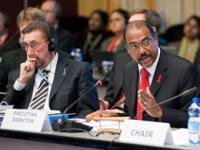
Mr Michel Sidibé, UNAIDS Executive Director with Dr Paul De Lay, UNAIDS Deputy Executive Director
Credit: UNAIDS/Bregnard
The 25th meeting of the Programme Coordinating Board (PCB) of UNAIDS opened today in Geneva. The PCB, currently chaired by Ethiopia, is the governing body of UNAIDS and convenes two times per year.
One of the key items on the agenda is the recently concluded Second Independent Evaluation of UNAIDS 2002-2008 (SIE) , which earlier in the year was deemed both a credible and independent evaluation by the Report Oversight Committee. UNIADS has also, through a participatory process by all levels of the organization, drafted a response to the SIE to be will be presented and discussed at the meeting.
The AIDS movement must be leveraged as a force for transformation in global health, development and environmental sustainability.
Mr Michel Sidibé, UNAIDS Executive Director
Another key agenda item is the presentation of a report on the anticipated impact that the financial crises will have on countries’ abilities to meet their universal access targets. The presentation will also outline recommendations and mitigation strategies of the impact of the global economic crisis on the AIDS response.
In the opening session, UNAIDS Executive Director Mr Michel Sidibé presented his report to the PCB, where members were provided with an update on UNAIDS’ activities since the last meeting.
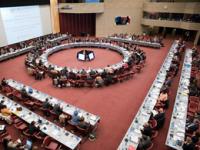
Members and delegates at the 25th Programme Coordinating Board of UNAIDS
Credit: UNAIDS/Bregnard
Not just outlining recent undertakings, Mr Sidibé in his address also envisioned two key goals for a successful AIDS response. “Firstly”, Mr Sidibé said, “the AIDS movement must be leveraged as a force for transformation in global health, development and environmental sustainability.”
Secondly, Mr Sidibé called for the mobilization of a prevention revolution. The UNAIDS head stressed that by adequate investments today the number of new infections by 2015 could be halved; “2.3 million new infections can be averted and $US 12.5 billion in treatment costs saved,” said Mr Sidibé.
The PCB consists of representatives of 22 governments from all geographic regions, the UNAIDS Cosponsors, and five representatives of nongovernmental organizations, including associations of people living with HIV. The meeting runs to the 10th of December and the next time the board will sit is June of 2010.
Michel Sidibé calls for prevention revolution in
Speeches:
Mobilizing Prevention as a movement for Universal Access (pdf, 360 Kb.)

Feature Story
UN Secretary-General and leaders join stars in “LIGHT FOR RIGHTS” event on World AIDS Day in New York City
07 December 2009
07 December 2009 07 December 2009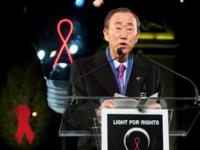
UN Secretary-General Ban Ki-Moon speaking at the "Light for Rights" event during the World AIDS Day celebrations in New York City.
Credit: UNAIDS/B. Hamilton
United Nations Secretary-General Ban Ki-moon joined with leaders in the AIDS response and entertainment stars at a dramatic public event commemorating World AIDS Day 2009 on 1 December at New York City’s historic Washington Square Park Memorial Arch.
Lights on the arch and other landmarks around the city were turned off at 6:15 pm to remember those lost to AIDS, and to represent how stigma, discrimination, fear and shame drive people with HIV into the darkness; then re-lighted to show how shining a human rights light on HIV can help people with HIV emerge from the shadows, to seek the information, treatments, care and support they need to live healthy lives.
“On World AIDS Day this year, our challenge is clear: we must continue doing what works, but we must also do more, on an urgent basis, to uphold our commitment to reach universal access to HIV prevention, treatment, care and support by 2010,” UN Secretary-General Ban Ki-moon said. “This goal can be achieved only if we shine the full light of human rights on HIV. AIDS responses do not punish people; they protect them.”
If we shine a human rights light on people with AIDS, they can emerge from the darkness to gain access to treatment, information, care and support to allow them to live normal lives.
Dr Paul de Lay, UNAIDS Deputy Executive Director, Programme
Joining the event were Naomi Watts, Oscar-nominated actress and UNAIDS Goodwill Ambassador; Christine C. Quinn, Speaker of the New York City Council; Oscar winner and UNICEF Goodwill Ambassador Susan Sarandon, Dr Paul De Lay, Deputy Executive Director of UNAIDS; and Tembeni Fazo, a counselor and educator for HIV-positive African and Caribbean immigrants in New York; and Cheyenne Jackson, a star on television and now on Broadway, who opened the evening.
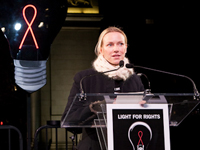
UNAIDS Goodwill Ambassador and actor Naomi Watts addressed the event in New York.
Credit: UNAIDS/B. Hamilton
UNAIDS Goodwill Ambassador Naomi Watts highlighted the injustice of stigma. “It has been both unfortunate and unfair for HIV infection to be considered a shameful disease, for people living with HIV to be judged as blameworthy, and for AIDS to be equated with certain death. I have personally seen that dignity and hope have been strongest among those whose lives were changed by HIV.” As UNAIDS Goodwill Ambassador, Watts has used her celebrity status to raise AIDS awareness and give a greater voice to the needs of people living with HIV.
“We are here tonight to shine a light on the human rights that are so central to the success of the fight against AIDS. And we’re here to recommit ourselves to bringing an end to the global AIDS epidemic,” said Kenneth Cole, renowned fashion designer, chairman of Kenneth Cole Productions, and chairman of the board of trustees of amfAR (The Foundation for AIDS Research), who hosted the event.

UNAIDS Deputy Executive Director, Programme Paul De Lay at the "Light for Rights" World AIDS Day event. New York, 01 December 2009.
Credit: UNAIDS/B. Hamilton
The event launched the global LIGHT FOR RIGHTS campaign organized by amfAR, UNAIDS, Broadway Cares/Equity Fights AIDS, and the World AIDS Campaign. UNAIDS Deputy Executive Director Paul De Lay confirmed UNAIDS support, “UNAIDS is excited to participate in the launch of this two-year campaign to shine a light on the importance of humans rights for achieving universal access.
“If we shine a human rights light on people with AIDS, they can emerge from the darkness to gain access to treatment, information, care and support to allow them to live normal lives,” he continued.

Dr De Lay called Tom Viola, Executive Director of Broadway Cares/Equity Fights AIDS, and Marcel Van Soest, the Executive Director of the World AIDS Campaign, to join him on stage and thanked their organizations for the commitment to co-sponsor the two-year LIGHT FOR RIGHTS campaign. Dr De Lay also thanked Mr. Cole for his leadership on the campaign and for the LIGHTS FOR RIGHTS brand and Red Ribbon Light Bulb symbol, which the design team of Kenneth Cole Productions developed in consultation with the four co-sponsoring organizations.
Other speakers spoke powerfully of the shared responsibility we have to ensure rights are protected.
Ms Susan Sarandon, who was a leader of efforts to free HIV-positive Haitian refugees from the HIV detention Camp at Guantanamo Bay, Cuba in the early 1990’s, recalled the long struggle against stigma and isolation facing people living with HIV, and said that ensuring respect for human rights is essential. City Council Speaker Quinn highlighted how the lack of equality for segments of the general population including the inequality of men who have sex with men, drug users, sex workers and women and girls, heightens their vulnerability to discrimination and marginalization, which makes them especially at risk of contracting HIV.
Other landmarks around the city that dimmed their lights and then re-illuminated them as part of the LIGHT FOR RIGHTS event included: the Chrysler Building; Rockefeller Center; Lincoln Center, including the Metropolitan Opera, Avery Fisher Hall, the David H. Koch Theater and the Revson Fountain; the MetLife Building; Madison Square Garden; the Beacon Theatre; 33 Broadway theaters; and Radio City Music Hall.
UN Secretary-General and leaders join stars in “L

Feature Story
UNAIDS launches framework for partnership with religious organizations
07 December 2009
07 December 2009 07 December 2009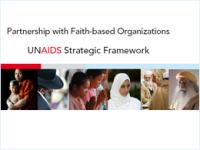
UNAIDS has launched a new strategic framework for partnership with Faith-Based Organizations (FBOs) in its response to HIV at the Parliament of the World’s Religions. It is evidence of stronger partnerships between UNAIDS and FBOs.
Faith-Based Organizations have been major providers of HIV-related services. The World Health Organization estimates that faith-based groups provide between 30% and 70% of all healthcare in Africa. In some areas, faith-based hospitals or clinics are the only health-care facilities that exist. FBOs are also a major source of AIDS funding, particularly in some of the least developed countries.
The goal of the framework is to encourage stronger partnerships between UNAIDS and FBOs in order to achieve universal access to HIV prevention, treatment, care and support. It includes the integration of FBOs in comprehensive national AIDS responses.
UNAIDS Country Coordinator for Papua New Guinea, Dr Tim Rwabuhemba, presented the report titled Engaging Faith-Based Organizations for the MDGs: the UN Experience to Parliament of the World’s Religions which runs until 09 December in Melbourne.
Dr Rwabuhemba communicated a message of support from UNAIDS Executive Director Michel Sidibé, “This is a unique achievement. The framework is not about how the UN system can help FBOs, but rather about how UNAIDS and the faith-based community can work together to achieve joint goals, build commitment and shared ownership; with a common resolve to achieve results in achieving universal access.”
The framework is the result of an 18-month consultation process between the UNAIDS Secretariat and Cosponsors, FBOs, networks of people living with HIV, government representatives and technical experts.
The framework is designed to encourage global and national religious leaders to take supportive public action in the AIDS response and create strong partnerships between UNAIDS and established FBOs working on HIV.
It also aims to promote strengthened links, including coordination and oversight, with FBOs at the country level to ensure that there is an appropriate interface as part of a comprehensive national AIDS response.
It hopes to target FBOs not yet working on HIV and mobilise local faith communities to become involved in the local AIDS response.
UNAIDS already collaborates with a wide range of larger FBOs, such as the World Conference for Religion and Peace, the Ecumenical Advocacy Alliance, the Tearfund, Caritas Internationalis, World Vision, Positive Muslims, the Buddhist Sangha Metta Project and the Art of Living Foundation.
The framework is intended to provide a structure for the development of ongoing workplans and partnerships in response to AIDS by the UNAIDS Secretariat, Cosponsors and FBOs.
Public positions, statements and responses of some FBOs have ranged, on occasion, from the unhelpful to the deeply harmful or hurtful, increasing rather than diminishing HIV-related stigma.
UNAIDS, through this framework, is now hoping to look beyond the prejudices and create partnerships based on mutual trust and respect and with joint commitments to achieving universal access targets.
The framework details that FBOs need to work towards ending stigma and discrimination and include people living with HIV in the design, programming, implementation, research, monitoring and evaluation of programmes and in decision-making processes.
UNAIDS, meanwhile, will advocate for FBOs and other organizations to be appropriately funded so that they can play a role commensurate with their capacities in supporting the development, implementation, monitoring and evaluation of national AIDS plans.
UNAIDS launches framework for partnership with re
Cosponsors:
Partners:
World Conference on Religion and Peace
Ecumenical Advocacy Alliance
Tear Fund
Caritas International
World Vision
Positive Muslims
Sangha Metta Project
Art of Living Foundation
Feature stories:
Developing strategies to work with Faith Based Organizations (10 April 2008)
Hindu faith leaders commit to AIDS response (18 June 2008)
Publications:
Engaging Faith-Based Organizations for the MDGs: the UN Experience (pdf, 439 Kb.)
Scaling up effective partnerships: a guide to working with faith-based organizations in the response to AIDS
HIV prevention, care and support across faith-based communities
What religious leaders can do about AIDS
Related

Feature Story
Online tool launched for UNGASS 2010 reporting
04 December 2009
04 December 2009 04 December 2009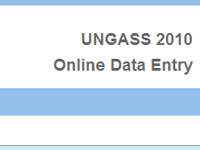
In adopting the 2001 Declaration of Commitment on HIV/AIDS, Member States committed themselves to regularly report to the United Nations General Assembly on the progress made in their country’s response to the AIDS epidemic. Member States submit Country Progress reports to the UNAIDS Secretariat every two years and the next reporting round will be in 2010.
In order to facilitate the 2010 UNGASS reporting process for countries, UNAIDS launches an online reporting tool. The new tool allows data to be entered over a period of time as and when it becomes available. This allows the information be shared which enables consultation country-wide. It also helps to track any changes in data during data validation. In addition to reporting on progress, countries will be able to enter their own national targets for 2010 and 2015 and can view data from earlier reporting rounds for trend analysis.
“A significant advantage of this tool is that it is very easy to use. It does not require any software installation or configuration - just an internet connection”, says Dr Deborah Rugg, Chief of the UNAIDS Monitoring and Evaluation Division.
As well as facilitating the consultative process and data vetting, by using the online tool it will be easier to monitor the status of countries’ data submission and the data management process both in country and globally.
After the report has been submitted, the data entered can be connected with other existing national programme data by exporting it to the Country Response Information System version 3 (CRIS3).
Process for reporting online
Between September and November 2009, a series of regional workshops took place for countries to test the online tool and be trained on how to enter their data. The first training took place in Latin America in September. In addition, a self-paced online training module is available from November onwards.
All countries received communication from UNAIDS requesting the name of the national UNGASS focal point, who received a unique username and password to access the online reporting tool and to submit the country report.
From 1 December 2009, countries are able to access the tool with their unique credential, and start entering their data. The data entry and submission must be completed by 31 March 2010, which is the deadline for submission of UNGASS country reports.
For access to the online reporting tool, go to: www.unaids.org/UNGASS2010. Please also consult the UNGASS Guidelines on Construction of Core Indicators for 2010 reporting for more information about the indicators and process.
For more information contact Mr. Taavi Erkkola (erkkolat@unaids.org).
Online tool launched for UNGASS 2010 reporting
Feature stories:
New UNGASS Guidelines for 2010 reporting (31 March 2009)
Much progress to report: UNGASS 2008 (12 March 2008)
UNGASS 2008: Country progress reports (04 February 2008)
Contact:
For more information contact Mr. Taavi Erkkola (erkkolat@unaids.org)
Tools:
CRIS: Country Response Information System
For access to UNGASS online reporting tool, please go to ungass2010.unaids.org
Publications:
UNGASS Guidelines on Construction of Core Indicators for 2010 reporting (pdf, 612 Kb.)
2001 Declaration of committment on HIV/AIDS (pdf, 1.84 Mb.)










